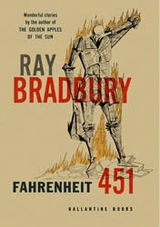
n novel
by Ray Bradbury
. The novel presents a future American society where reading is outlawed and firemen start fires to burn books. Written in the early years of the Cold War
, the novel is a critique of what Bradbury saw as issues in American society of the era.
In 1947, Bradbury wrote a short story titled "Bright Phoenix" (later revised for publication in a 1963 issue of The Magazine of Fantasy & Science Fiction
).
It was a pleasure to burn.![]()
I'm seventeen and I'm crazy. My uncle says the two always go together. When people ask your age, he said, always say seventeen and insane.
![]()
Monday burn Millay, Wednesday Whitman, Friday Faulkner, burn 'em to ashes, then burn the ashes. That's our official slogan.
![]()
"Do you ever read any of the books you burn?" He laughed. "That's against the law!" "Oh. Of course."
![]()
You're not like the others. I've seen a few; I know. When I talk, you look at me. When I said something about the moon, you looked at the moon, last night. The others would never do that. The others would walk off and leave me talking. Or threaten me. No one has time any more for anyone else. You're one of the few who put up with me. That's why I think it's so strange you're a fireman, it just doesn't seem right for you, somehow.
![]()
I sometimes think drivers don’t know what grass is, or flowers, because they never see them slowly. If you showed a driver a green blur, Oh yes! he’d say, that’s grass! A pink blur! That’s a rose garden! White blurs are houses. Brown blurs are cows. My uncle drove slowly on a highway once. He drove forty miles per hour and they jailed him for two days. Isn’t that funny, and sad, too?
![]()
"That's sad," said Montag, quietly,(referring to The Hound) "because all we put into it is hunting and finding and killing. What a shame if that's all it can ever know."
![]()

